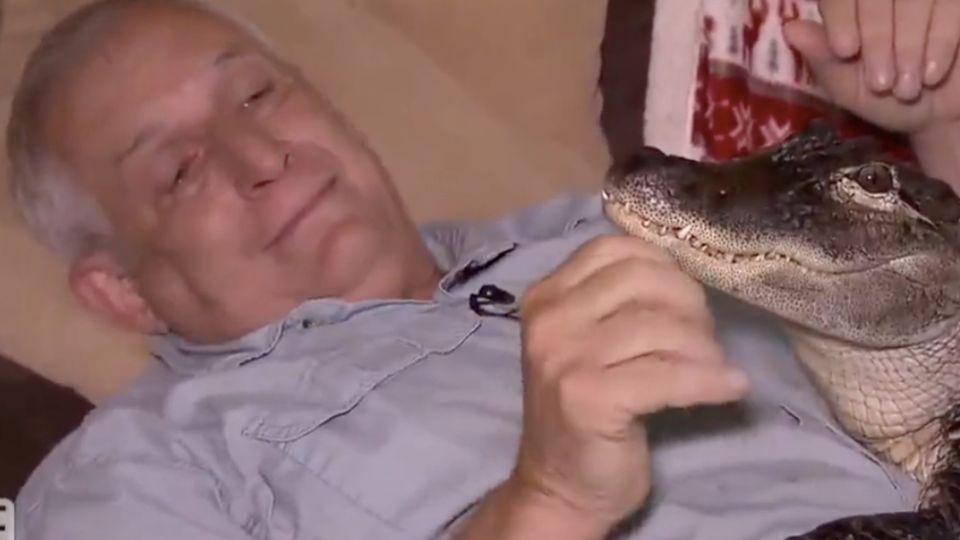A man from Pennsylvania, who has been using an alligator named Wally to help with his depression for almost ten years, is currently looking for the reptile. Wally went missing while the man was on vacation in Georgia.
Joie Henney has many followers on social media who are interested in his pages dedicated to Wally, the alligator that he considers his emotional support animal. He has shared pictures and videos on the internet of people touching the 5 1/2-foot (1.7 meter) alligator as if it were a dog or hugging it like a teddy bear. Wally became extremely popular last year when he was not allowed to enter a Philadelphia Phillies game.
Henney is very upset because Wally disappeared while they were on a vacation in Brunswick, Georgia. Brunswick is a port city located 70 miles (112 kilometers) south of Savannah. According to him, he believes that someone took Wally from the outdoor enclosure with a fence where Wally stayed overnight on April 21.
Henney mentioned in his social media posts that pranksters left Wally outside someone’s home. The person called the authorities, and as a result, Wally the alligator was caught and released back into the wild. “We really need as much help as possible to bring my baby back,” Henney said in a video posted on TikTok, while crying. “Please, we need your assistance.”
When The Associated Press called Henney on Wednesday morning, he said he didn’t have time to talk. He did not respond to the follow-up messages right away.
The man from Jonestown, Pennsylvania, said that he got Wally in 2015. Wally was rescued in Florida when he was 14 months old. In 2019, Henney told The Philadelphia Inquirer that Wally helped Henney feel better when they were feeling sad after losing some close friends. He said that a doctor who was treating his depression had approved Wally’s status as his emotional support animal.
“He has never tried to bite anyone,” Henney told the newspaper. According to spokespersons for the city and county police departments, no one has reported the missing alligator in Brunswick and the surrounding Glynn County to the police.
The Georgia Department of Natural Resources received a report about a bothersome alligator in the Brunswick area on April 21. This was the same day when Henney mentioned that Wally went missing. The department sent a licensed trapper to catch the alligator. The agency stated that the alligator was set free in a distant area, but they are unsure if it was the specific alligator named Wally.
Also Read: 14-year-old Suspect Dead After Active Shooter Reported Outside Middle School
In Georgia, it is against the law for people to have alligators as pets without a special license or permit. The state Department of Natural Resources does not give out permits for keeping pet alligators. In Pennsylvania, it is not against the law to own alligators. However, it is illegal to release them into the wild, as stated by the Fish and Boat Commission.
David Mixon is a wildlife biologist and coastal supervisor for the Georgia Department of Natural Resources. He has experience dealing with alligators that are found in people’s yards and swimming pools. He has also shown alligators that are kept in captivity during presentations to school groups and Boy Scout troops.
He explained that even alligators that appear calm can still be dangerous. To stay safe, he always ensures to keep their mouths closed using his hand or, if possible, a band.
“They are unpredictable, and they often react to stimulus,” Mixon said. “There are many videos and pictures where people interact with alligators without getting injured.” However, the longer you spend in their presence, the higher the chances of getting hurt.
Florida, which has about 1.3 million alligators, has had over 450 cases of alligators biting humans without being provoked since 1948, according to state wildlife officials. Since 2014, there have been over 90 incidents where alligators have bitten people, and unfortunately, six of those incidents resulted in fatalities.
According to Lori Kogan, a psychologist and professor at Colorado State University who studies how humans and animals interact, in places where it is allowed to have pet alligators, they can sometimes be considered emotional support animals.
According to Kogan, emotional support animals do not receive any special training unlike service animals that assist people with disabilities like blindness or post-traumatic stress. They do not have an official registry. However, health professionals often write letters of endorsement for owners who have a diagnosed mental health condition.
“People can become very emotionally connected to different types of animals,” Kogan said. “Is it possible to form an emotional bond with a reptile?” Will it make you feel better? Yes, I would say yes. Personally, you mean? No.



Leave a Reply